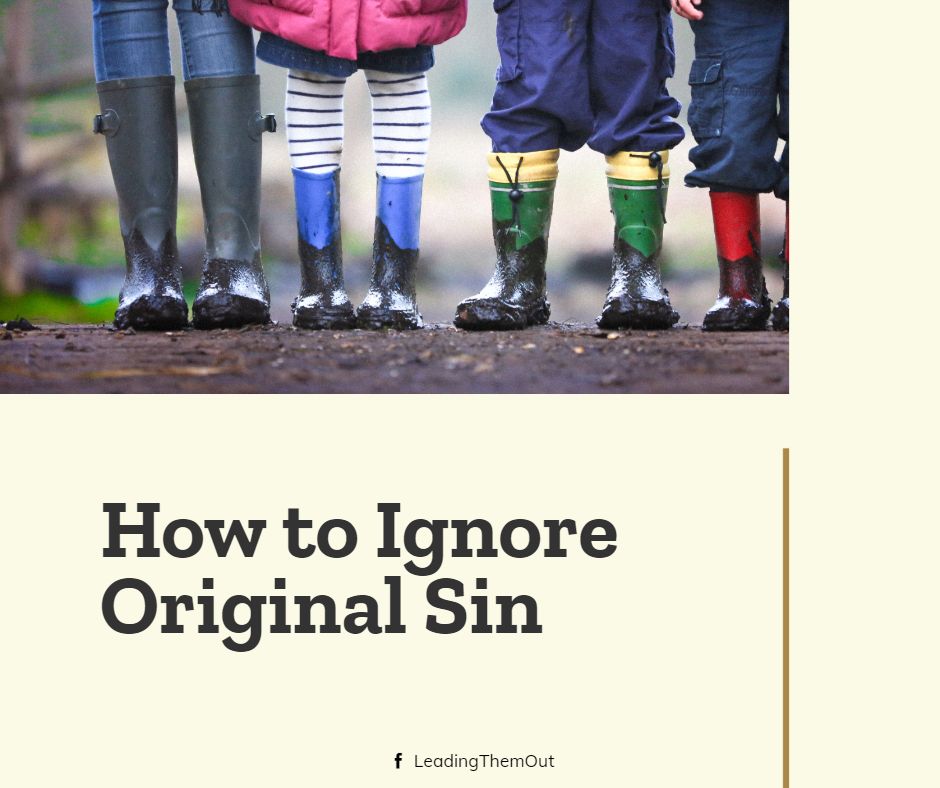I remember being a very excited first-time expectant mum. I read all the pregnancy booklets from start to finish. I tracked the growth of my unborn child online and could tell you when his heart was beating and whether he had fingernails or not. I read the books on weaning, potty training and child development and wondered why my children could only string two words together when other children were speaking full sentences. However, the most significant conversation that I had regarding my beautiful children was the one with parents who gently reminded me about the reality of original sin.
I find that a good understanding of the doctrine of original sin helps me to parent more graciously. I am not surprised by misbehaviour and I realise that their sin come from me, but I also believe that we are not to be passive towards sinfulness in our children. The learning curve has been a steep one and since I am particularly excellent at learning how not to do something first, then allow me to share with you several outstanding ways of ignoring original sin in our children:
1. We Say That Sin in its Early Stages is Cute
Our younger set of twins are champions at locating the sweets stashed away by their older siblings. It is VERY cute to find them stuffing chocolate into their mouths whilst in hiding! However, ultimately, they know they should not be doing it (that’s why they hide!). They know they have been told not to touch them. Simple commands such as ‘no’, ‘come here’ and ‘sit down’ are understandable to very small children. If we do not teach them obedience, then we are training them in disobedience.
2. We Blame our Children’s Sin on Their Friends or on Their Environment
It is all too easy to blame our children’s bad behaviour on a friend’s influence (perhaps other parents think our children are the real culprits!). However, ultimately our children are not taught to sin. Has any parent taught their children to squabble with siblings or to ignore and disobey those in authority? Of course not! Sin is innate. Home educating our children is not about keep our children inside the home and sin outside of the home. There is sin in our homes, in our very hearts. I am not saying that we should not exercise care in which settings we place our children, which friendships and relationships we encourage or discourage, but that if our children sin it is primarily because ‘the heart is deceitful above all things’ (Jeremiah 17:9) and not necessarily because they wound up ‘with the wrong crowd’.
3. We Fail to Acknowledge Remaining Sin in Our Own Lives
The doctrine of original sin means that the Christian is at war against sin until his last breath. If we never acknowledge to our children our own faults and failings, our own struggle with sin and the fact that we fall far short of the very commandments that we are teaching them, then we are not showing them the seriousness and deadliness of this universal disease. We must (appropriately) confess sin to our children. If we never do this, we will frustrate our children, firstly because they live with us and they know are being hypocritical and secondly because if we never acknowledge wrongdoing then we give the impression that at a certain point it is possible to sin no more. This is a false doctrine and is utterly disheartening for a child to believe that a perfect life is possible when they are continually faced with their own failings.
4. We Think a Good Education is the Answer to Sin
This is what is known as the ‘Socratic Solution’. Socrates thought that the cause of evil was ignorance and that increase in knowledge was the answer. We see this idea played out time and time again in our school system, where the answer to drug abuse is more drug education where the answer to STDs and teenage pregnancy is more sex education. The answer to sin is not more information about that sin. The answer to sin is a godly education that teaches God ordained principles and commandments, repentance and the revelation that one man lived a perfect life in exchange for our own wretched life.
Ultimately the greatest way to ignore the doctrine of original sin is failure to continually point our children to the gospel and the grace of God, in season and out of season. We home educators have more opportunities than any pastor to instruct our children in the ways of the Lord. Great sin requires a sinless and perfect Saviour, the second Adam who never ignores sin but in choosing the cross in all its agony and shame bore the full weight of the iniquity of his people.

